Australian Prime Minister Anthony Albanese is in the United States on a four-day official visit. At the top of his agenda when meeting with U.S. President Joe Biden and members of Congress is AUKUS. This is because the 2021 agreement between Australia, the United Kingdom, and the United States to share military technology and better integrate their defense industrial bases is in danger of stalling.
If the three countries do not move forward with their pact, it will mean more than Australia’s failure to acquire up to five U.S.-designed Virginia-class nuclear-propelled attack submarines, which are vital to Canberra’s ability to project power beyond its immediate maritime periphery. AUKUS is a major strategic component of any U.S.-led pushback against China in the Indo-Pacific. If the arrangement makes no meaningful impact on altering the regional military balance of power, then the three allies, along with many other countries, will lose faith in the promise that a reinvigorated United States can lead the check on Chinese power.
In recent months, AUKUS has come under attack on both sides of the Pacific—from both supporters and opponents. For example, a significant group of legislators in the U.S. Congress support AUKUS in principle but are wary of the plan to sell existing nuclear-powered submarines to Australia for fear that the United States cannot build enough new submarines to meet its own needs. From the Australian side, former Prime Minister Kevin Rudd, the current ambassador to the United States, has publicly expressed frustration at the slow progress in changing U.S. export control provisions to enable the sale of submarines to Australia and fast-track the joint development of weapons, which is part of the AUKUS agreement as well.
That, in fact, is a main reason why Albanese is now in Washington. AUKUS will fail if the U.S. Congress does not reform its export control regime to allow a blanket exemption to U.S. International Traffic in Arms Regulations for Australia and Britain. But Australia is not without agency as to whether this plays out. Indeed, the onus is on Canberra to persuade skeptical Washington lawmakers that Australia, which pushed for AUKUS in the first place, is deserving of an exception. This means Albanese has some explaining to do on this visit. His government has declared that China’s rise and assertiveness confront Australia with the most difficult strategic circumstances since it fought Japan in World War II, an assessment given urgency in the Australian government’s 2023 Defence Strategic Review.
Even so, Australian defense spending—both in real, absolute numbers and as a percentage of GDP—will barely rise, if at all. Progress on specific AUKUS commitments, such as investment in future Australian submarine infrastructure and bases and developing a domestic industrial and innovation base to accelerate the pact’s other initiatives, is painfully slow. Waiting for the United States to reform its export control regime cannot be Australia’s excuse for acting so slowly.
A promised Australian review of surface fleet requirements has also been delayed. On current projections, Australia is unlikely to build any new surface combat vessels before 2030. These delays and this underspending question how seriously Canberra really takes its own assessment that the strategic environment in Asia is rapidly deteriorating and that Australia needs to lend its weight to collectively deterring China from using force over the next several years.
Moreover, the debate within Australia’s governing Labor Party will only increase the concerns some U.S. lawmakers have about AUKUS. At the party’s national conference in August, Albanese reassured his fellow party members that AUKUS will deliver tens of thousands of well-paid, unionized jobs for Australians. This may be true, but the pact’s primary purpose is to advance security objectives. Everything else, including the Labor Party’s jobs goals, is secondary.
Since a key purpose of AUKUS is to deter China and change its calculations away from deploying force against Taiwan or elsewhere, the signatories need to make a meaningful impact on altering the regional military balance of power in the Taiwan Strait, the South China Sea, and any other likely theaters of conflict. This requires detailed strategic and military scenario planning combined with clear and iron-clad commitments on burdens and responsibilities. This means answering difficult questions, such which capabilities will be needed to defeat China in various theaters and where these assets should be deployed.
AUKUS—as well as the Australia-New Zealand-United States alliance—also needs to overcome the free-rider problem that justifiably concerns U.S. lawmakers in both parties. Many of Washington’s allies claim they are all-in with the United States when it comes to deterring revisionist, expansionist, and authoritarian powers such as China. But they also know that the less capable and less prepared their militaries are, the less Washington might expect from them.
AUKUS will fail without wholehearted Australian commitment, on which Biden should press Albanese this week. If the pact stalls, the United States and the region will be worse off. Albanese needs to spend more money on developing and deploying the weapons Australia needs, make that decision quickly, and offer a clearer picture of Canberra’s commitment in various contingencies that might arise. Over the next few days, he needs to reassure the administration and doubters in Congress that he is serious about righting AUKUS and that the United States and Britain were justified in taking a huge punt on Australia.















